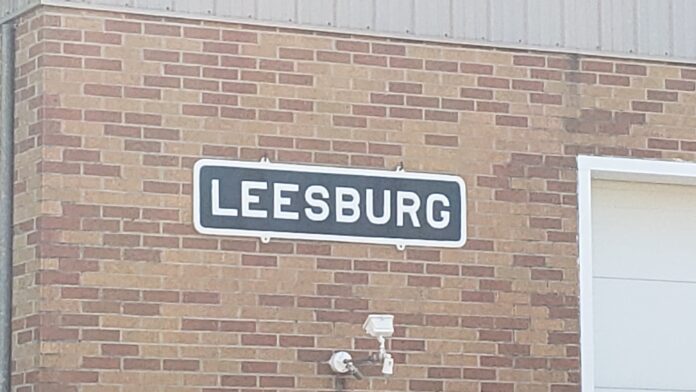Leesburg Town Council tabled a decision Monday on a contract with Claypool Police Department for CPD to do traffic control for Leesburg.
Councilman Doug Jones brought a copy of the proposed contract to the meeting and explained it.
“What this is going to do for us is establish an hourly rate or a monthly rate or a yearly rate, depending on how you want to look at it, to go into a contract with the city of Claypool for their police department to do some patrolling for us,” Jones said.
Traffic control issues and speeding have been topics of discussion during Council meetings for several months.
Jones said one of the nice things about Claypool, as opposed to the sheriff’s office, is CPD has a marshal. The marshal has the ability to do traffic control for Leesburg, as well as help to enforce the town’s ordinances. Jones said he was told, but doesn’t know the legalities of it, the sheriff’s office cannot enforce a town’s ordinances.
Council President Tom Moore said that wasn’t true. Jones said either way, CPD can enforce Leesburg’s town ordinances. Jones said the town will have use of the officer or officers for more than traffic control if the town needs them.
Jones said the hourly rate would come out to $13. The annual rate would be $5,000, which could be billed annually or monthly. If billed monthly, the rate would be $416.66.
Jones said there is a clause that allows the contract to be terminated by either side in 45 days.
Over the course of the year, that would give the town a total of 384 hours of patrol time, which would be broken down to six to eight hours a week.
Moore asked who would keep track of the hours. Jones said that hadn’t been discussed. Street Commissioner Craig Charlton suggested the officer call dispatch to clock in and out so there’s some sort of record.
Jones said the sherriff’s office was very responsive when “we had an issue. They came in and helped us out, but they also have a whole county to patrol. And it’s obvious they can’t be here every minute. And we do have some issues that we as a town board can’t deal with, traffic control being one of them.” He said he found this to be a way to take care of the issue.
The decision was tabled after town attorney Vern Landis said he would like to take a further look at the contract.
In other business, Charlton said he received a complaint of a lady who fell on a sidewalk on Van Buren Street and injured herself. Charlton said areas, including sidewalks, that are considered trip hazards are the responsibility of and a liability to the property owner.
It seems “rather strange” that Leesburg had a sidewalk replacement program for a “number of years” and few people seemed to take advantage of the program, Moore said.
Charlton said the town will pay for the concrete for a sidewalk that is 66 foot long, 5 foot wide, 4 inches thick. The property owner will have to pay for the removal and installation of the sidewalk, but the town will pay for the concrete.
Charlton said he had three people in the last two months ask for paperwork to take part of the program. They haven’t gotten back to him yet.
Charlton said some of the people are in the targeted area where he believes sidewalks need to be fixed. Some of the people that asked for paperwork have told Charlton that if someone falls, it’s the property owner’s responsibility.
Charlton said he doesn’t know if the Council wants to identify those residents and let the property owners know of their responsibility. He asked if the town doesn’t call those property owners out, if the town is then responsible if someone falls.
Landis said in most cases, it’s obvious the sidewalk is in disrepair. The liability comes into play if the property owner has been negligent. If the town wants to do that, they can, but it should be obvious the sidewalk needs to be fixed.
In other business, the Council:
• Learned the K21 grant application has been submitted. Councilwoman Christina Archer said it has not been voted on yet by K21. The project chosen by Leesburg is walkways and bikeways going up and down Van Buren Street.
• Approved the reinstatement of normal sewer rates for churches, restaurants and bars. The rates had been reduced due to the COVID-19 pandemic.





